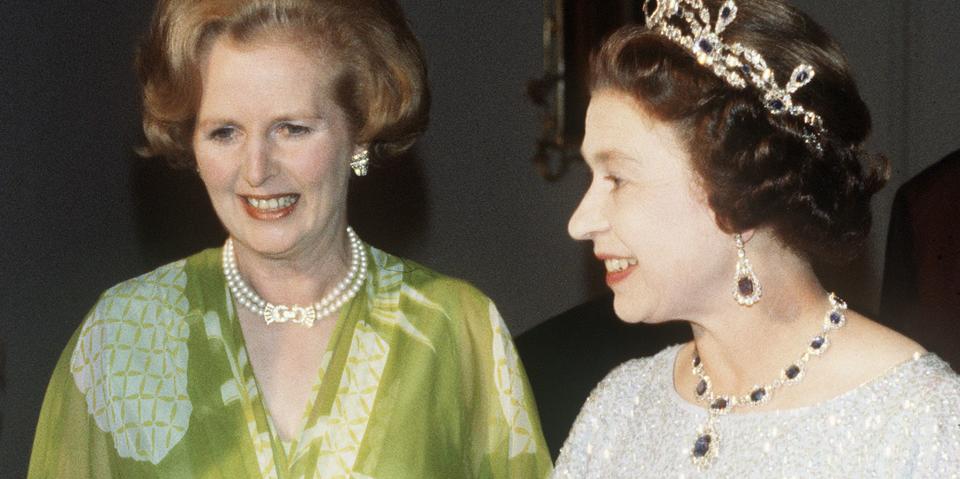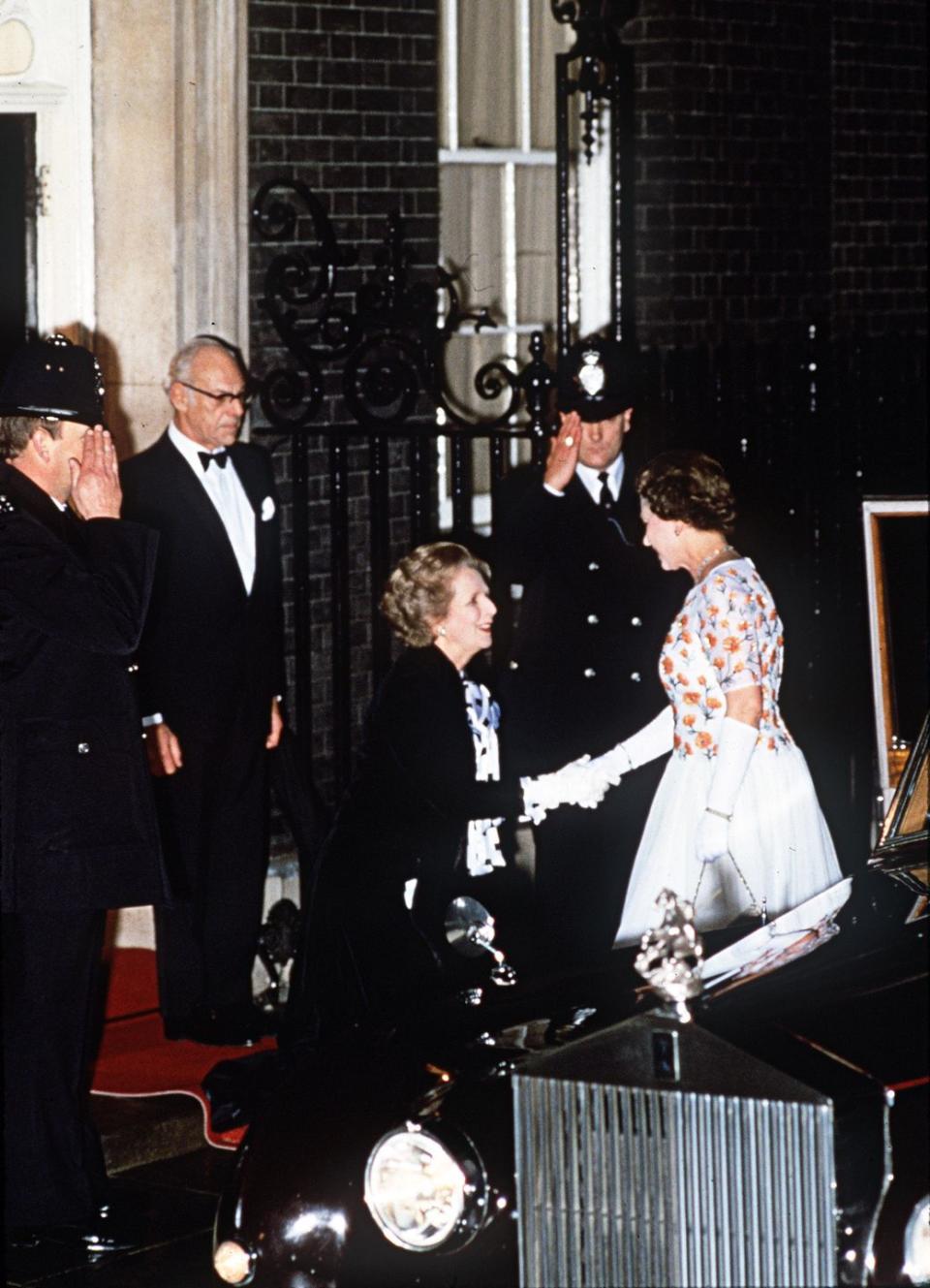Margaret Thatcher’s relationship with the Queen was much more nuanced than 'The Crown' portrays

Gold Stick, the first episode of season 4 of The Crown, depicts the moment Margaret Thatcher became prime minister of the United Kingdom in 1979. “We don’t count our chickens before they hatch, and we don’t count No. 10 Downing Street before it’s Thatched,” Gillian Anderson, as Thatcher, says in the episode.
The first woman prime minister of the UK made history for that fact alone, but her reputation as a leader, whose stubbornness guided her decisions, transformed Britain into what Eugene Robinson, for The Washington Post, called a postindustrial society. "In effect, she redrew the lines of British society—despite professing not to believe in society, she did speak of it occasionally—by painting the working class, and especially the labour unions, as an impediment to middle-class prosperity," Robinson wrote the day before her funeral in 2013. Many consider Thatcher an enemy of the working class, and she remains a polarising figure in Britain. Even her status as a feminist icon—she reportedly loathed the movement—continues to be debated.
Thatcher was a radical Conservative, a paradox with which many people were not comfortable: “Conservatives traditionally want to uphold the social order that they inherit, but she wanted to upend the postwar British consensus and return the country to what she regarded as its older glory,” journalist Timothy Stanley wrote for CNN after her death. The Conservatives long had a complicated relationship with trade unions, and Thatcher essentially went to war with them. In The Crown, we see British union workers strike and protest against Thatcher, as well as the Queen’s growing frustration with her prime minister’s insistence that her course of action is the only correct one.
Watch: Who is Margaret Thatcher?
With all this tension, The Crown viewers might wonder what the relationship between this particular prime minister and her Queen was really like. The two women were only about six months apart in age (Thatcher was the Queen’s senior - as she reminds her in one memorable scene), and although they were from the same generation, they saw the world very differently. There's no way we can know exactly what the two spoke about—the Queen’s audiences with her prime ministers at Buckingham Palace, a tradition she took over from her father, are private—but we can speculate. “Fundamentally, the relationship between any PM and the Queen tends to be a secretive one, and there are amazingly few references to the Queen in Thatcher’s voluminous memoirs,” playwright Moira Buffini, who wrote the play Handbagged about Thatcher and the Queen, told The Telegraph in 2013.
So, what happened when the two got together to drink tea at Buckingham Palace for the Queen’s famous audiences with her prime minister?
Their relationship was reportedly tense
Senior officials close to the situation said there was “stiffness” between the two early in Thatcher’s term, per The Real Elizabeth: An Intimate Portrait of Queen Elizabeth II by Andrew Marr. Others said both women didn’t want to appear together because of the optics of having two women at the centre of British leadership.
The two women had very opposite leadership styles. The 2014 Amazon Prime documentary The Queen and her Prime Ministers notes, according to Tatler, that they had a relationship that was “awkward at times” because of the rules that came with each of their roles. In 1982, journalist Anthony Sampson noted the strongest difference between the two: “The relationship is the more difficult because their roles seem confused. The Queen’s style is more matter-of-fact and domestic while it is Mrs Thatcher (who is taller) who bears herself like a Queen.” Ben Pimlott’s biography of the queen, titled The Queen, reports an unnamed politician said Thatcher was “in awe of the position” of the Queen: “She was affected by the aura, the trappings, but she was slightly nervous.” Thatcher reportedly once called the palace to inquire about the Queen’s wardrobe so they wouldn’t clash at an event, and the palace told her: “Don’t worry, the Queen never notices what other women are wearing.”
On top of all this, they has starkly different backgrounds. Thatcher was from the small town of Grantham, Lincolnshire,danis and deeply admired her father, who was a grocer, preacher, and politician. The queen was, well, a royal. As Marr writes in The Real Elizabeth, these social differences were new for the royal family. For example, Thatcher liked to stay at the dinner table with the men when the rest of the women excused themselves, as was customary in royal life. The solution, according to Marr, was to have an informal barbecue. Her husband, Denis Thatcher, was reportedly Thatcher’s secret weapon.
“He was equally adept at intervening to protect his wife at tricky social moments and making himself scarce when she had state business to attend to,” Marr wrote. “Denis Thatcher got on well with the Queen Mother, enjoyed a drink as much as she did, and was punctilious about royal protocol.”
Thatcher wrote in her own memoir that the rumours of her unfriendly relationship with the Queen were exaggerated: “Although the press could not resist the temptation to suggest disputes between the Palace and Downing Street, I always found the Queen's attitude toward the work of government absolutely correct,” she wrote.
As The Crown depicts, they had differences in political views
The Queen was aware of the tensions within Britain’s unions. Per The Radio Times, Thatcher’s biographer, John Campbell, wrote that the Queen “feared that the Government’s policies were wilfully exacerbating social divisions: she worried about high unemployment and was alarmed by the 1981 riots and the violence of the miners’ strike.” As Tatler reports, between March 1984 and March 1985, a total of 187,000 miners left their jobs. Thatcher opposed the strike from the miners while the Queen reportedly felt sympathetic toward the wives of the miners.

In episode 8 of season 4 of The Crown, titled 48:1, there is mention of the “open secret” that the queen was “deeply frustrated by Thatcher’s refusal to back sanctions agains the apartheid regime in South Africa”. The Queen has famously never been open about her political beliefs, which is protocol for the head of the commonwealth: “As head of state, the Queen has to remain strictly neutral with respect to political matters,” the royal family’s website states. “By convention, the Queen does not vote or stand for election, however, Her Majesty does have important ceremonial and formal roles in relation to the government of the UK.”
But, in 1986, there were reports, such as this July story from The LA Times, that “the monarch and the prime minister are headed for a clash unless Thatcher agrees to sanctions against Pretoria,” one of South Africa’s three capital cities. The Queen reportedly feared the Commonwealth would break apart. As The New York Times reported in August 1986 and The Crown portrays, Thatcher agreed to “limited sanctions” on South Africa, but she refused to “endorse the stiffer program of other Commonwealth leaders,” which reportedly displeased the Queen. This reporting does not state whether the Queen had a role in getting Thatcher to agree to the sanctions she did sign, but The Washington Post stated the monarch reportedly made the prime minister aware of “her displeasure”.
There was awkwardness at Balmoral, too—at least at the start
As The Balmoral Test episode of The Crown portrays, Thatcher infamously flopped the series of secret examinations the royal family is said to give their guests at their private estate in Scotland.
“Mrs Thatcher loathed having to go once a year to Balmoral,” Campbell wrote in his biography The Iron Lady: Margaret Thatcher, from Grocer's Daughter to Prime Minister. “She had no interest in horses, dogs or country sports and regarded the outdoor life—long walks and picnics in all weathers—which the royal family enjoyed on holiday, as "purgatory". Though she frequently told interviewers that she loved nothing better than a country walk, she never had any suitable shoes and had been forced into borrowed Hush Puppies or green wellingtons. She could not wait to get away and on the last morning was up at six as usual, with her thank-you letter written, anxious to be off as soon as [her husband] Denis was ready. The Queen was almost certainly equally glad to see her go.”
However, it sounds like Thatcher might've actually had something resembling fun at Balmoral over the years. According Town & Country, the book Elizabeth: The Woman and the Queen reports that the Queen enjoys doing the housekeeping at her Scottish home, and Thatcher once brought her some rubber gloves as a cheeky Christmas gift.
Thatcher had a great deal of respect for the Queen—and things smoothed out
Bernard Ingham, Thatcher’s former chief press secretary, said in the Amazon documentary that she was “extremely respectful of the monarchy” and always showed up 15 minutes early for her meetings with the Queen at the Palace.
The Real Elizabeth also notes that, as time went on during Thatcher’s more than 11 years as prime minister, the women developed a “mutual affection”. A senior Buckingham Palace official said in the 2012 book: “The Queen always saw the point of Margaret Thatcher. She understood that she was necessary.”

As The Independent reported at the time of Thatcher’s death in 2013, the Queen was said to have felt so bad when the prime minster’s cabinet forced her out in 1990 that she invited Thatcher to a horse-racing event. Friends of the ousted PM told the newspaper she appreciated the invite, though she was not in the mood to attend and declined.
That same year, the Queen honoured Thatcher with the Order of Merit, which she gives to 24 living people. Thatcher filled the spot left open by Lawrence Olivier when he died in 1989. At the time she received this honour, The Baltimore Sun reports, Harold Brooks-Baker, the publishing director of "Burke's Peerage", said this honour was direct evidence that the two didn’t have an unpleasant relationship.
Joe Little, editor of Majesty magazine, echoed this in an interview with The Times in 2013: “The Queen attended Lady Thatcher’s 80th birthday party—prior to that the feeling was that there was not much love lost between them,” he said. “But the fact that she went to a personal event such as that underlined the empathy between them.”
Upon Thatcher’s death, the royal family released the following statement on their website: “The Queen was sad to hear the news of the death of Baroness Thatcher. Her Majesty will be sending a private message of sympathy to the family.”
The Queen went on to lead the 2,000 mourners present at Thatcher’s funeral.
In need of some at-home inspiration? Sign up to our free weekly newsletter for skincare and self-care, the latest cultural hits to read and download, and the little luxuries that make staying in so much more satisfying.
Plus, sign up here to get Harper’s Bazaar magazine delivered straight to your door.
Watch: Is The Crown a true story?
You Might Also Like

